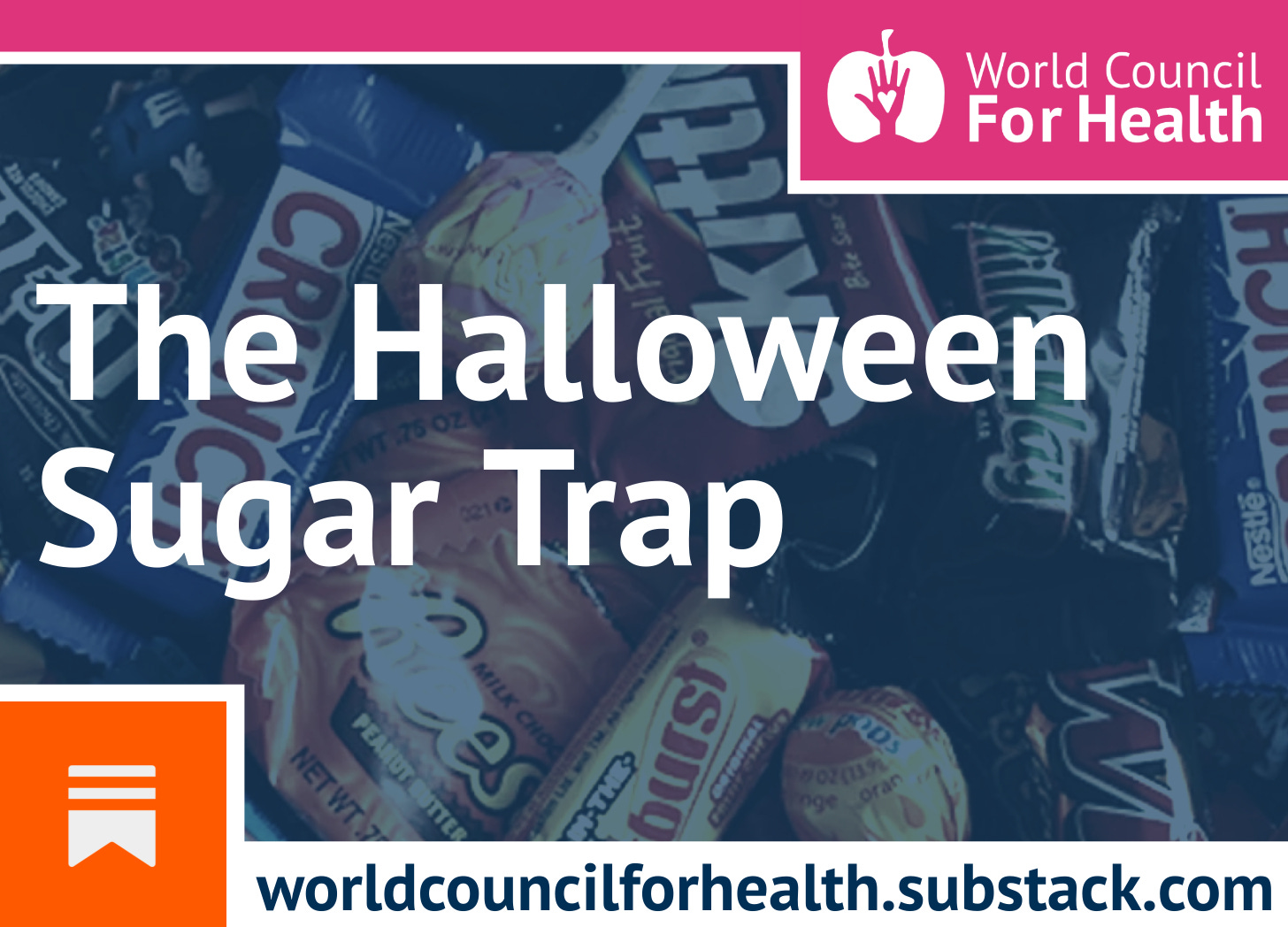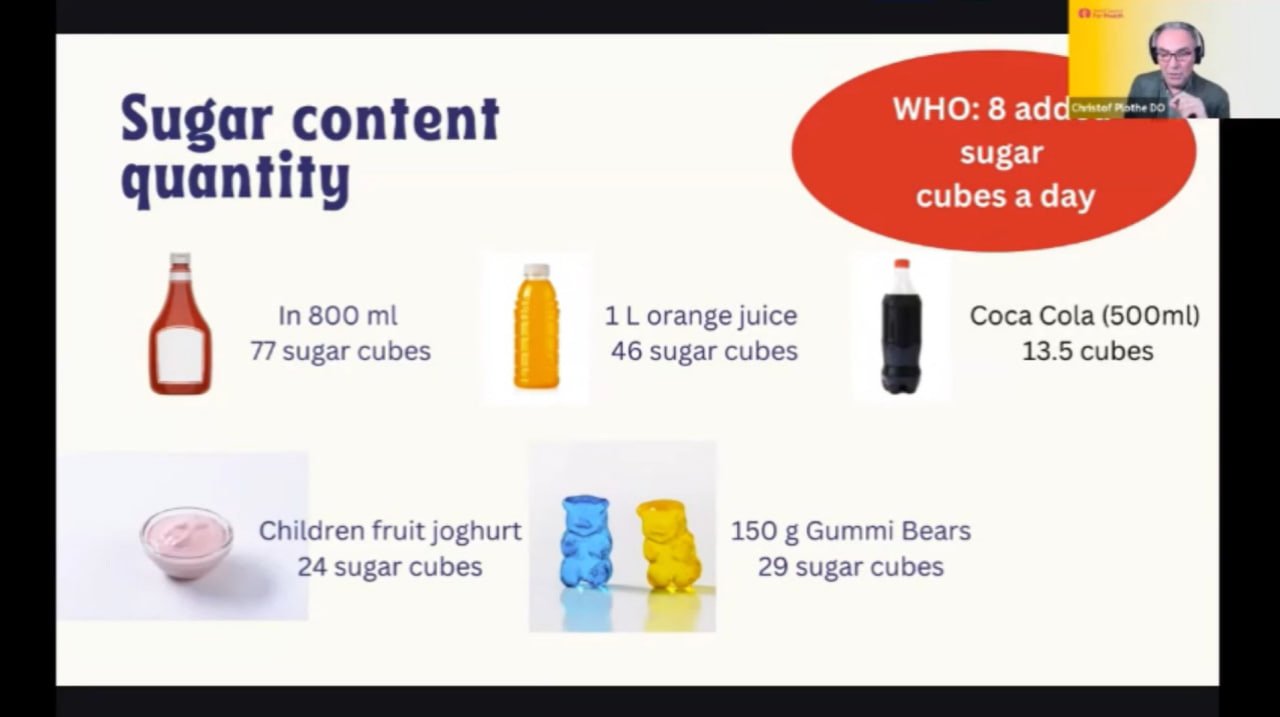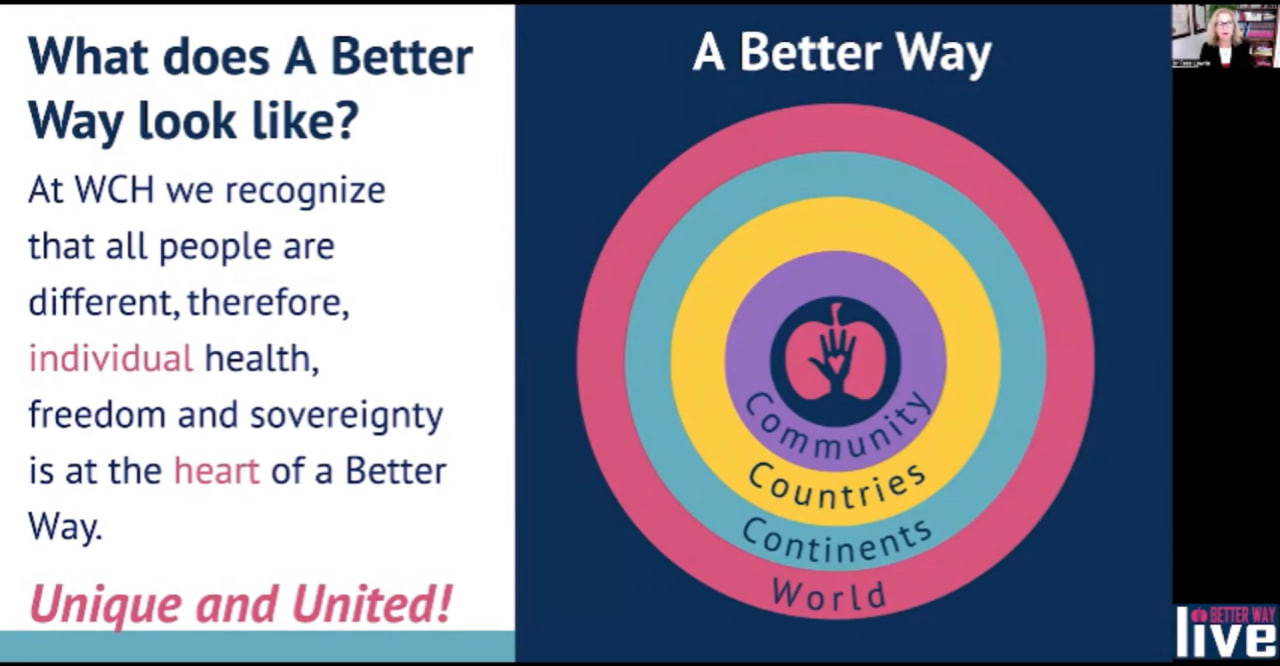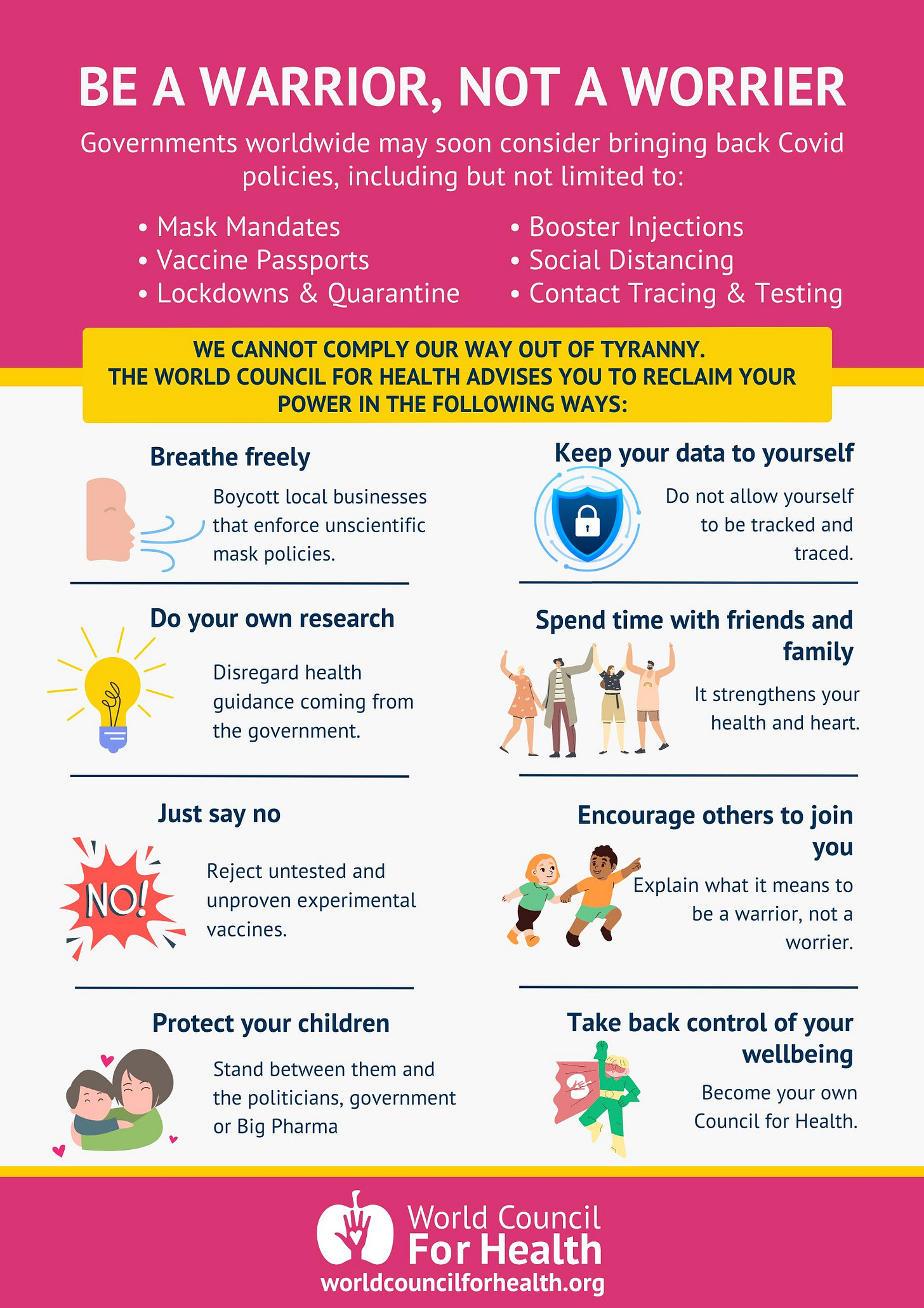The Halloween Sugar Trap, and Co-Creating a Better Way
Halloween is upon us, and tonight sugary treats will be dished out to millions of children already addicted to the high-sugar, low-nutrient Western diet. What could possibly go wrong?
Written by World Council for Health Correspondent Alice Ashwell, PhD.
Halloween is upon us, and tonight sugary treats will be dished out to millions of children already addicted to the high-sugar, low-nutrient Western diet that is a major contributor to unnecessary health issues in a world that should know better.
The World Council for Health’s (WCH’s) Better Way Live conversation hosted by Emma Sron on Monday 30 October 2023 featured a well-timed presentation by WCH Steering Committee member Christof Plothe, DO on the importance of avoiding this ‘sugar trap’. Dr Tess Lawrie followed up with an exciting update on the work of the dynamic WCH team.
In case you missed it, you will find the recording at the WCH Newsroom.
Mainstreaming sugar, destroying health
There has been an enormous increase in chronic diseases in Western society since World War 2. According to Christof Plothe DO, about 80% of these diseases are related to our diet, with refined sugar being the greatest culprit.
The massive increase in sugar consumption hasn’t been an accident – it’s been promoted for decades by industry. Firstly, in the 1950s and 60s, the sugar industry worked with scientists to downplay the role of sucrose in causing coronary heart disease, and to make people believe that fat and cholesterol were the problem.
Then, in the 1970s, food scientists discovered what they called the ‘bliss point’ – levels of salt, fat and sugar that actually make processed foods addictive, enticing consumers to buy those products, and increasing profits for the manufacturers. It’s no surprise then that today about 80% of supermarket-bought food is loaded with sugar.
Sugar has been shown experimentally to be eight times more addictive than cocaine! It triggers the body’s dopamine-based reward system, which ensures that we always want to ‘come back for more’. Our palates are trained from an early age – even in utero, according to Christof, where the mother’s sugar-rich diet can predispose her baby to obesity later in life.
Our sugar-dependency has become so mainstream that WHO now says that 25 grams (six teaspoons or eight cubes) of added sugar per day is acceptable. It’s worse in the USA, with the CDC and FDA stating that twice that amount is reasonable – despite the obesity crisis in that country where two-thirds of adults are considered overweight.
However, as the following graphic illustrates, it is quite difficult to remain within these recommended limits:
The USA leads the way in sugar consumption, with an average of 126.4 grams per person consumed per day, and 90% of the population eating more than the amount suggested by the already over-generous guideline.
One of the major contributors to the increase in sugar consumption was the introduction in 1974 of high-fructose corn syrup (HFCS), an industrially produced sweetener now found in most convenience foods. The fructose in HFCS has been identified as the main cause of obesity, metabolic disease, and fatty liver.
Not as sweet as it seems
The industrialisation of sweetness has had multiple impacts on our health. Type 2 diabetes is the most obvious metabolic disease resulting from a high-sugar diet, but this also contributes to all other chronic diseases that afflict modern society: heart attack, stroke, dementia, gout, immune suppression, cancer, metabolic syndrome, and even premature ageing.
In his presentation, Christof described some of the physiological processes that contribute to these conditions.
YOU are sweet enough!
The noticeable improvements in health that result from reducing our sugar intake are a motivation to be patient with ourselves during the relatively short period of adaptation that is inevitable as we literally ‘detox’ from a high-sugar diet.
In addition to obvious physical improvements such as weight loss and pain relief, one soon becomes mentally sharper, and emotionally more balanced. Most importantly, our new eating habits can prevent and even heal chronic conditions.
Christof offers some tips to help with this transition, including:
Get high-sugar foods out of your kitchen.
Eat two to three meals a day, and don’t snack in between.
Use sweeteners in their natural form, e.g. dates, maple syrup, honey, molasses.
Monitor your blood sugar, HbA1c, cholesterol, potassium levels.
Take potassium, which is required to store sugar as glycogen rather than fat; kale and legumes are good natural sources.
Eat colourful food and fermented foods to feed your friendly gut bacteria.
Eating well is one of the foundation stones of the ‘Better Way’. So, enjoy good food with good company and a good conscience!
A World Council for Health Update with Tess
It is remarkable what the World Council for Health (WCH) has achieved in the two short years of its existence. Established in 2021 in response to the massive changes wrought by the manmade health crisis known as Covid-19, WCH is creating an alternative to the World Health Organization, aiming “to engage and unite people in all countries to co-create a Better Way for a Better World.”
After introducing the WCH’s mission, vision, partners, and the principles outlined in the Better Way Charter, Tess shared a slide (below) that clearly elucidates the bleak, tyrannical future envisaged by WHO.
Juxtaposed are the features of the world we DO want, and which – with the help of WCH – we ARE currently co-creating.
Promoting integrative health, freedom, and sovereignty
As illustrated by Christof’s presentation (above), WCH promotes and supports people taking personal responsibility for their health through an integrative approach.
They also promote the freedom to think, speak, travel, and choose freely; encourage self-reliance and supportive communities; and stand up for individuality, common sense, elder wisdom, and genius.
Sovereignty, or self-governance, is a critical aspect of being able to create and thrive.
Much achieved – and many firsts
WCH has achieved a great deal since 2021 – including a number of ‘world firsts’, which include:
The at-home Covid Treatment Guide (Sep 2021), viewed over a million times
The Spike Protein Detox Guide (Nov 2021), available in 27 languages, also viewed over a million times
The Cease and Desist Campaign (Dec 2021), aimed at creating awareness of Covid-19 ‘vaccine’ harms
The STOP THE WHO Campaign (Apr 2022)
The first Better Way Conference (May 2022), which was livestreamed worldwide
The WCH C-19 Vaccine Pharmacovigilance Report (Jun 2022) confirming evidence justifying the recall of the Covid-19 ‘vaccines’
The Better Way Charter (Jul 2022) to guide international collaboration
A press conference with Dr Aseem Malhotra, and in-person UK Doctors’ Conference (Oct 2022)
A Policy Brief (Apr 2023) in response to proposed amendments to the IHR, and the WHO pandemic treaty
The second Better Way Conference (June 2023), which was livestreamed worldwide
A Policy Brief (Aug 2023) on The effects of unregulated digitalisation on health and democracy
A Policy Brief (Sep 2023) on human trafficking and ending modern-day slavery
Launching the Great FreeSet Challenge (Sep 2023).
Most recently (Oct 2023) WCH hosted an urgent expert hearing on DNA contamination in the Covid-19 mRNA shots, which proves that informed consent was not possible and opens the way for legal action against the pharmaceutical companies responsible.
Unlike WHO, the WCH prides itself in having no conflicts of interest, as it is funded by the events they organise, and by public contributions. This enables WCH to maintain its integrity and independence.
Localisation through Country Councils
Although established only two years ago, ten Country Councils have already been launched, with another nine due to be activated soon. These autonomous councils ensure that the work of WCH is rooted in place, working in appropriate ways to promote integrative health, freedom and sovereignty; develop decentralised, locally relevant policies and health guidance; and accredit health-promoting facilities, among other goals.
Importantly, these Country Councils will provide a platform for collaboration and development of locally relevant emergency guidance in the event of future public health emergencies of international concern (PHEICs).
The Great FreeSet Challenge
WCH is all about co-creating a better way, and to that end it invites participation in alternatives to the top-down strategies being foisted upon us by supranational bodies like WHO and the World Economic Forum (WEF). The ‘Great Free Set Challenge’ is WCF’s answer to the WEF’s Great Reset!
Believing that the way forward is about creating rather than fighting, the invitation is to sign up to the Great Free Set Challenge. Then, every two weeks you will receive an email message with a challenge to help you extract yourself from the system that is designed to exploit us. Just a few of the ten action areas include: rediscovering nature; perfecting our health and wellbeing; bolstering local communities; and becoming self-sufficient and sovereign.
We change the world by changing ourselves – so do sign up and help to co-create the Better World.
Finally, to create the better world we all want, we cannot live in fear or worry. We will never be able to comply our way out of tyranny, nor to react our way out of tyranny. Instead we must create our way out of tyranny.
In short, we need to be warriors, not worriers!
Tess left us with a stirring rendition of WCH’s Warrior Anthem. YES! We ARE warriors for the light, unique and united!
What a way to end this inspiring update.
If you find value in this Substack and have the means, please consider making a contribution to support the World Council for Health. Thank you.









C’mon, let’s once a year going crazy...f*ck suger and all the bad it brings for this day...have fun and enjoy...If you don’t know by now that (to much) sugars is not good for you, then you deserve all the stuff sugar can do.
It is just what endocrinologists pray for.